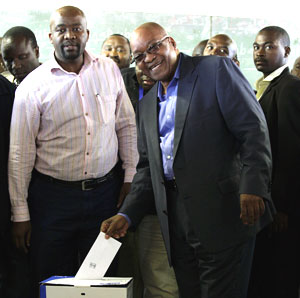UNITED NATIONS (FinalCall.com) – Political analysts looking at the man who will be named president of South Africa by its Parliament sometime in early May say 67-year-old Jacob Zuma has a warmth and charm that endears him to the masses of his country.

He is also clever, but not too clever, and is aware of his lack of academic credentials.
“President Zuma is a populist, a man of the people,” said Viola Plummer, co-founder of the Brooklyn-based December 12th Movement, which is active on the domestic and international front when it comes to Black politics and Black causes. Ms. Plummer told The Final Call she met Mr. Zuma back in 1999 “through the comrades in Zimbabwe.”
“At that point he was extremely popular with the young and the landless,” Ms. Plummer recalled. That appeal has changed over the years and was part of his election April 22 as the fourth post-apartheid and fourth Black president of South Africa.
Mr. Zuma’s biographers say he comes from a rural community now known as the KwaZulu-Natal. He is a Zulu traditionalist and has three wives and has emerged from accusations of bribery and rape unscathed. Mr. Zuma tended cattle after the death of his father, a policeman, rather than attend school. At age 17 he joined the ANC, serving in Umkhonto We Sizwe, “Spear of the Nation,” its military division.
The apartheid government threw him in jail in 1963 for trying to overthrow the government, where he served 10 years on the Robben Island, where former President Nelson Mandela also served his time.
One commentator said Mr. Zuma’s background will help him forge an administration that will be open, with the president keeping a light hand on the levers of power. The commentator said Mr. Zuma would be a president who would have an ear on the ground with a commitment to people who have yet to fully benefit from a democracy born in 1994.
Economic analysts say Mr. Zuma is expected to keep the nation that many say is Africa’s most important democracy on a path of economic and macro-economic stability. He will be tougher on crime and is expected to have a vigorous AIDS policy.
According to the CIA Fact Book on South Africa, there are 5.7 million people living with HIV/AIDS in a population of over 49 million people.
“South Africa is a powerhouse, that is true,” said Dr. Leonard Jeffries, professor of Africana and Black Studies at the City University of New York. Dr. Jeffries told The Final Call he has never met Mr. Zuma, but is confident the new president will challenge the perception that Black leadership in South Africa must pacify the White minority, which still has “control over the country’s economics.”
The Financial Times reported unemployment in South Africa is running around 22 percent. The International Monetary Fund predicts economic shrinkage in South Africa at 0.3 percent. The South African external debt is estimated at $39.69 billion, while borrowing so far in 2009 is at eight percent of the national income.
The Black population is 79 percent, Whites 9.6 percent and those referred to as “Coloreds” at 8.9 percent. South Africa has an abundant supply of natural resources; a stock exchange that is ranked 17th in the world, and a modern infrastructure.
Observers say Mr. Zuma will have to quiet the fears of investors that his tenure won’t be anti-business.
South Africa’s most pressing challenge in the economic sector will be whether President Zuma can close income disparities and implement government policies that are fair and efficient, stated Dr. Ron Walters, professor of government and politics and director of the African American Leadership Institute at the University of Maryland.
Editorialists in South Africa say Mr. Zuma is saddled with repairing government failure to deliver improvements in healthcare, housing and education. Dr. Jeffries said reparations could be on the agenda, but South Africans must raise the issue. “If you can’t raise the issue of reparations in South Africa, where do you raise it?” asked Dr. Jeffries.
Ms. Plummer, Dr. Jeffries and Dr. Walters agreed a major issue facing Mr. Zuma will be land reform. “The land issue in South Africa is a tinderbox,” Dr. Jeffries said. “The people who backed him (Mr. Zuma) want to reclaim their land. The ANC almost exploded over the land issue,” said Dr. Walters.
The key for the new president, according to Dr. Walters, will be the people “he has around him” and how they “advise him” through his early days in office.
“Zuma’s presidency will usher in the long awaited better life for all,” predicted one editorial. South Africa faces serious problems of poverty created by the longstanding racial apartheid system that oppressed Black South Africans, denying them services and opportunities as well as AIDS and crime.












